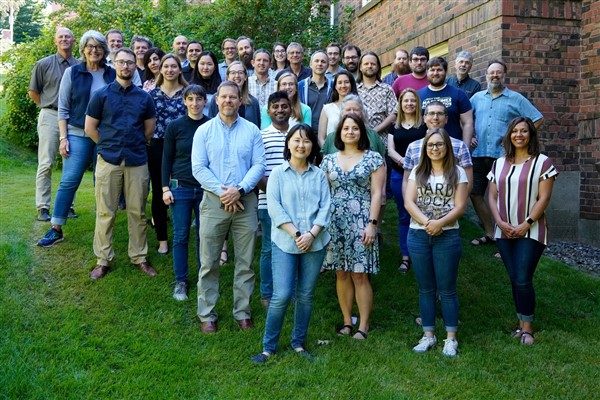Working Group leader: Jean-Marc Gauthier
Group members: Clayton Christensen, Payton Finney, F. B. Wróblewski
Originated: April 2019
Description: This Working Group is part of the U of I’s NSF Track-2 EPSCOR Grant. They hold virtual reality meetings and user evaluation meetings bi-monthly.
The DVPS workgroup develops a novel approach to storytelling in the metaverse. During the past two years, we created new viewer’s experience immersed in the virtual ecosystems of Paradise Creek, a small river running between Moscow (Idaho) and Pullman (Washington). Realizing some of the original environment was altered, we created a story where herons and humans encounter each other in unexpected ways and the original river space could be discovered.
Feedback:
“Your work and achievements, and the projects at the Virtual Reality Lab at University of Idaho greatly contribute to our AR/VR/MR community at SIGGRAPH.” Anna Queiroz, Ph.D. Virtual Human Interaction Lab, Stanford University / Immersive Pavilion Chair, SIGGRAPH 2023
Current projects:
AUGMENTING VIRTUAL LUNAR TERRAIN WITH PROCEDURAL AND MACHINE LEARNING MODELS IN REAL-TIME
54th Lunar and Planetary Science Conference 13-17/03/2023, J. M. Gauthier, Virtual Technology and Design, and F. B. Wróblewski, Department of Earth and Spatial Sciences, University of Idaho.
“Moments in Nature” (MiN), a collaborative storytelling environment in virtual reality. (2022) was selected with the 10 best virtual reality projects worldwide and presented at Real Time Live! Siggraph Asia 2022 an international conference and exhibition on computer graphics and interactive techniques, in Daegu, South Korea. (12/2022). Credits: Jean-Marc Gauthier in collaboration with Payton Finney. Narration by Savannah Thomson. Music and sound design by Alex Ho. VTD collaborators: Emma Ferguson, Clayton Christensen and Randall Erickson. Jean-Marc Gauthier, All Rights Reserved. December 2022.
VR Classroom online project, version 1.0 (2021- 22) and version 2.0 (2022- 23). Interdisciplinary virtual reality project to be part of a new online curriculum. Design and implementation by Jean-Marc Gauthier in collaboration with Clayton Christensen, Brian Cleveley (VTD), Rayce Bird, (VTD) and Ken Udas, Vice-Provost for Digital Learning Initiatives.
Virtual Forest VR project (2022 to present). Interdisciplinary virtual reality project as part of a new online curriculum in partnership with the US Forest Service and other agencies. Design and implementation by Jean-Marc Gauthier in collaboration with Sunny Wallace Office of the President & Office of the Provost and Executive Vice President, Heather Heward, CNR, Charles Goebel (CNR) and Ken Udas, Vice-Provost for Digital Learning Initiatives.
Fire Danger animations (2022- present). Hand drawn animations created for the Fire Danger group at University of Idaho and the US Forest Service. Created by Jean-Marc Gauthier, Payton Finney and Ciara Bordeaux.

